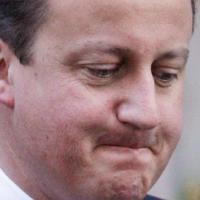
The Tories are thrashing around in ever-deeper water on the issue of Europe.
Over half of Tory backbenchers voted against the Queen’s speech – their own government’s legislative agenda because it didn’t announce a referendum on membership of the European Union (EU).
David Cameron was reduced to backing a private member’s bill legislating for a 2017 referendum, which won’t legislate at all, because the Tories don’t have a majority to pass it.
The issue of Europe is also widening the chasm between the Tories and Lib Dems – who were blamed for the absence of referendum legislation – although Lib Dem leader Nick Clegg has tried to mitigate this by saying that a referendum is inevitable at some stage.
The Lib Dems are languishing in single-figure poll percentages and the Tories are in turmoil, immersed in bitter, acrimonious division, currently over gay marriage as well as Europe. Many Tories dismiss their leader as weak and incompetent.
Former Tory chancellor Nigel Lawson delivered Cameron a blow earlier this month by arguing that Britain should quit the EU.
Present cabinet ministers Michael Gove and Philip Hammond have also pinned their colours to the exit mast, saying that if there was a vote today they would opt to leave the EU.
Weighing in against them came another former Tory chancellor, Geoffrey Howe, in last Sunday’s Observer mocking Cameron for his twists and turns – Cameron is under sustained attack from both sides of the debate.
Howe berated the Tory leadership for "in effect running scared of its own backbenchers, let alone Ukip, having allowed deep anti-Europeanism to infect the very soul of the party".
He fears that if the Conservative Party loses the next general election it "will move to a position of simply opposing Britain’s continued membership" of the EU.
Richard Branson and 18 other corporate chiefs joined in to push the case for staying in the EU, "the world’s largest trade bloc", in a letter published by the Independent.
As the EU is basically a bosses’ club that enshrines big business interests and neoliberalism in its treaties, much of British big business views it as beneficial and they fear British capitalism losing trade, power and influence in the event of an exit.
Eurosceptics
On the other hand, braying Tory eurosceptics and Ukip members demand withdrawal, but no more in the interests of working class people than those who lead the call to stay in.
They want to escape from EU decisions – loss of ’sovereignty’ for the British ruling class – also from closer EU integration, and in vain from contagion from the eurozone crisis.
Any talk of being outside of anti-working class EU regulation on budget cuts and privatisation is largely a smokescreen, because they support cuts and privatisation in Britain.
For socialists, the bosses’ EU must be firmly opposed, because the crumbs it allows in workers’ rights are far outweighed by its fundamental character of existing in the interests of the capitalist classes.
It was conceived as a project to overcome the limits of developing the productive forces within the borders of Europe’s nation states and to aid Europe’s competition with other capitalist powers and blocs.
But it is unable to remove the antagonisms between the ruling classes and all the barriers between the states.
Only an alliance of democratic socialist states – a socialist confederation – will be able to develop the productive forces onto a significantly higher level and use the wealth generated in the interests of the majority in society.
RMT general secretary Bob Crow was right to boldly say in a RMT press release (13.5.13) that his union "will not sit back and allow this debate to be dominated by Ukip and the right wing of the Tory Party…
"RMT will continue to set out the left-wing pro-worker case for British withdrawal from the EU that puts jobs, standards of living, democracy and public services centre stage."
In a comment piece on the Guardian website a few days later (17.5.13) he graphically described the plight of many of Europe’s workers: "In the countries hit hardest by the ’troika’ of banks and bureaucrats, youth unemployment tops 60% and the millions of personal tragedies of lost homes, jobs, pensions and services are testament to the sick joke of ’social Europe’."
Socialists and trade unionists need to emphatically oppose the capitalist EU while recognising that whether in or out of it, we have to build a mighty movement of opposition to the government’s cuts.
Attacks
Politicians leading the main UK political parties are not innocent prisoners of EU-imposed or suggested austerity measures, they all generally support such attacks whether Britain is part of the EU or not.
This includes the Labour Party leaders who intend to continue inflicting cuts and privatisation if they win the next general election.

Protest in London to defend the NHS, 18 May 2013, photo: Luca Neve
This makes preparation for a determined electoral challenge by the Trade Unionist and Socialist Coalition (TUSC) – in which the RMT plays a key role – extremely important for the next local and parliamentary elections, also for the European elections on 22 May 2014.
TUSC can play a crucial role in opposing the bosses’ EU while countering the anti-EU nationalism of the right and far right, putting forward instead the need for solidarity and coordinated struggle of workers and the unemployed across Europe.
In addition, building support for candidates who stand as part of TUSC will help to lay the ground for the creation of a new mass workers’ party, urgently needed to arm workers with a political weapon against austerity and for a socialist alternative.

Be the first to comment